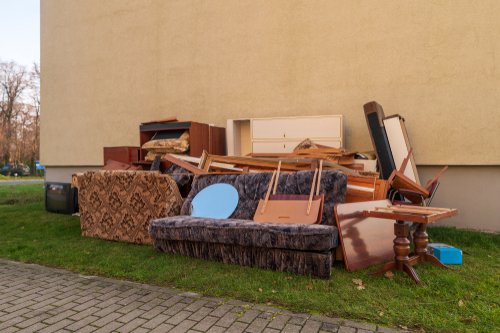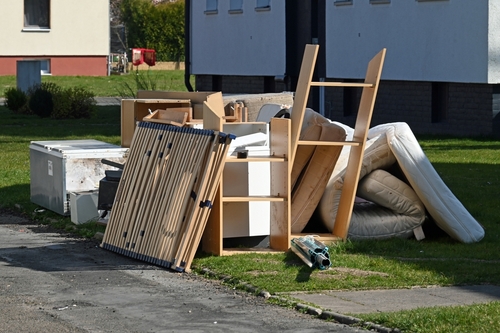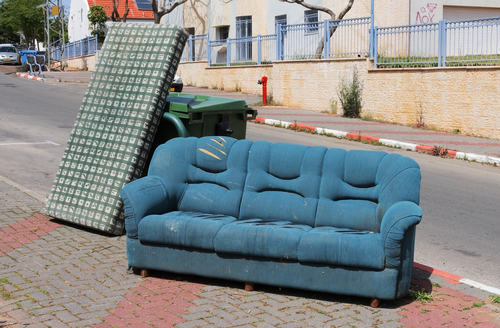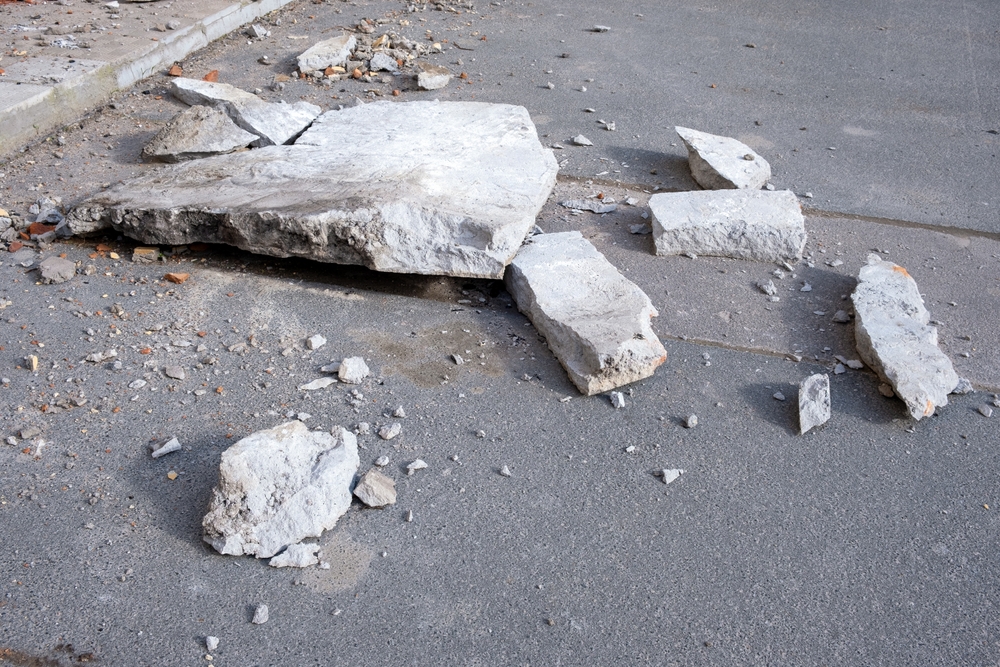March 22, 2024 - Benjamin Ehinger
Getting Rid of Furniture: Efficient Disposal and Donation Strategies
CALL NOW 844-762-8449
When the time comes to part with old furniture, it can often be a challenge to figure out the best way to dispose of it. Whether you’re downsizing, renovating, or simply refreshing your space, getting rid of furniture is a task that needs careful consideration. It’s important to evaluate the condition and value of each item to determine the most suitable disposal method. From selling to donating, each option has its own merits and challenges that you’ll need to navigate.
If your furniture is no longer suitable for use and you’re looking for a convenient way to handle larger quantities, considering a home dumpster rental from Waste Removal USA is an effective solution. Affording you the flexibility to dispose of a variety of items on your own time, a furniture dumpster can be an efficient and stress-free way to clear your space. Moreover, selecting the right disposal method not only helps you free up space, but can also contribute positively to the environment when you choose eco-friendly disposal or recycling options.
 When you decide to refresh your living space or downsize, selling your used furniture can be a lucrative way to declutter. Here are focused strategies you can employ to get the best value out of your furniture pieces.
When you decide to refresh your living space or downsize, selling your used furniture can be a lucrative way to declutter. Here are focused strategies you can employ to get the best value out of your furniture pieces.
 When you need to remove old furniture from your home, professional junk removal services can be a convenient option. They save you time and effort, and with the right company, you can ensure that your unwanted items are disposed of responsibly.
When you need to remove old furniture from your home, professional junk removal services can be a convenient option. They save you time and effort, and with the right company, you can ensure that your unwanted items are disposed of responsibly.
Key Takeaways
- Evaluating the condition of furniture is essential before disposal.
- Renting a furniture dumpster provides a flexible disposal solution.
- Choose a disposal method that is both convenient and environmentally responsible.
Understanding Furniture Disposal Options
When it’s time to get rid of old furniture, you have multiple options to consider, each with its own environmental and practical implications.Donate Furniture
If your furniture is in good condition, donating it to charities or thrift stores can be an excellent way to give it a second life. Many organizations even offer pick-up services for larger items.Recycling
Recycling can minimize waste by breaking down your furniture into reusable materials. Check your local facilities for guidelines, as recycling rules can vary widely.Junk Removal Services
Junk removal services can take the hassle out of furniture disposal. They typically charge a fee, but they will handle everything from lifting to transportation.Sell or Give Away
Selling your furniture or offering it for free on online platforms can be a quick way to dispose of it. Hosting a garage sale is another viable option.Disposal via Landfill
As a last resort, taking furniture to a landfill should be considered. However, be mindful of the environmental impact this has, and explore your other options first. Remember, the right option for you depends on factors like the condition of your furniture, your location, and whether you’re willing to pay for furniture removal or prefer a more DIY approach. Choose wisely to ensure a responsible and effective way to dispose of furniture.Preparing to Get Rid of Furniture
Before you attempt to rid yourself of old furniture, an important step is assessing the item’s condition and determining the best disposal or repurposing method. This includes checking for tears, stains, and evaluating whether the furniture is too heavy or large to move easily, and if it’s worth the effort to repair.Assessing Furniture Condition
- Stains and Tears: Inspect every piece for stains and tears. Use a checklist to note these issues. They will significantly affect how you can dispose of or sell your furniture.
- Minor stains or tears: These may be cleanable or repairable. Consider if these fixes are within your ability or if professional help is needed.
- Major damage: Severely damaged furniture may be more difficult to sell or donate, and might need to be recycled or disposed of responsibly.
- Structural integrity: Check if the furniture is still sturdy and functional. Shaky legs or a broken frame often indicate it’s time to recycle or dispose of the piece.
Item Categorization
Organize your furniture into categories to simplify the next steps in the disposal process. A table can help:| Category | Examples | Action |
|---|---|---|
| Lightly used | Furniture with minimal wear-and-tear | Potential to sell or donate. |
| Heavily used | Pieces with notable damage | Consider repair if valuable, or recycle/dispose. |
| Bulky and heavy | Large, difficult-to-move items | Assess if professional removal services are required. |
- Items in good condition: You may sell these, especially if they have value or are antique. Websites like The Family Handyman suggest garage sales or online marketplaces.
- Heavily used items: If furniture is in poor condition but too bulky to easily remove, look into services mentioned on platforms like Green Coast, which recommend junk removal companies.
Options for Selling Used Furniture
 When you decide to refresh your living space or downsize, selling your used furniture can be a lucrative way to declutter. Here are focused strategies you can employ to get the best value out of your furniture pieces.
When you decide to refresh your living space or downsize, selling your used furniture can be a lucrative way to declutter. Here are focused strategies you can employ to get the best value out of your furniture pieces.
Online Marketplaces
In the digital age, online marketplaces have become a primary choice for selling used furniture efficiently. Platforms like Facebook Marketplace offer a vast audience and the convenience of categorizing your item by location and type. This tailored approach may increase the chances of finding buyers in your local community. Another reputable option is OfferUp, an app designed for quick and easy sales, where you can list your furniture for free and negotiate directly with potential buyers.- Key Features:
- Facebook Marketplace: Localized, vast audience, no listing fees.
- OfferUp: User-friendly, mobile-oriented, integrated messaging.
Garage Sale
Hosting a garage sale is a traditional method that can yield immediate results. It’s an ideal approach if you have multiple items to sell and wish to avoid the hassle of shipping. Your furniture is given a new life, and buyers can inspect the quality firsthand. Remember to advertise your garage sale in local newspapers or online platforms like Craigslist to maximize visibility.- Advertising Channels:
- Local newspapers.
- Community bulletin boards.
- Online listings on Craigslist.
Consignment Shops
If you prefer a hands-off approach, consider consignment shops. These stores sell your furniture and take a percentage of the profits as their fee. It’s an appealing option if you have high-quality or unique pieces and don’t want the trouble of direct selling. Look into local consignment stores with a good reputation to ensure your furniture is well-marketed.- Pros:
- Professional selling and marketing.
- No direct involvement needed post-drop-off.
Donations and Charitable Contributions
When you decide to part with your furniture, donating to non-profit organizations, thrift stores, or specialized donation centers can be a responsible and charitable choice. Your contributions can support community programs, assist those in need, and extend the life cycle of usable items.Non-Profit Organizations
Non-profit organizations often provide a direct way for you to contribute to your community. Organizations such as Habitat for Humanity collect furniture to furnish homes for people in need. Additionally, the Salvation Army offers free furniture donation pick up, making it convenient for you to donate bulky items.Thrift Stores
Goodwill is one of the well-known thrift stores where you can donate furniture. Sales proceeds from your donations fund job training and other services. Thrift stores typically accept a wide range of items, ensuring your well-loved pieces find a second home.Specialized Donation Centers
There are also specialized donation centers catering to specific needs. For instance, certain homeless shelters accept furniture donations to create comfortable living spaces for residents. By donating to local organizations like Green Drop, you can support various charity programs, including those for veterans.Eco-Friendly Disposal and Recycling
When deciding to get rid of your old furniture, you have the power to make environmentally conscious choices. Your actions can promote sustainability and reduce waste. Here are some eco-friendly disposal methods and recycling options you should consider.Recycling Centers
Your local recycling centers offer a pathway to sustain the environment by diverting furniture from landfills. These facilities often have the capability to dismantle items and salvage materials such as metal, wood, and textiles for recycling. To find a recycling center near you that accepts furniture, it’s recommended to call ahead or check their website to understand their specific guidelines and procedures. This ensures that your furniture is accepted and properly processed, contributing to a more eco-friendly cycle of use.Repurposing Ideas
Before disposing of your old furniture, consider repurposing it. With a little creativity, tables, chairs, and dressers can be transformed and given a new life. Repurpose an old dresser into planters for a stunning garden addition, or turn a table into a chic shelving unit. Your commitment to repurposing not only benefits the environment by reducing waste but also adds unique and personal touches to your home. By reimagining your furniture, you’re actively contributing to a sustainable future.Professional Junk Removal Services
 When you need to remove old furniture from your home, professional junk removal services can be a convenient option. They save you time and effort, and with the right company, you can ensure that your unwanted items are disposed of responsibly.
When you need to remove old furniture from your home, professional junk removal services can be a convenient option. They save you time and effort, and with the right company, you can ensure that your unwanted items are disposed of responsibly.
Cost Considerations
Furniture removal through a professional service can vary in price based on several factors including the amount of furniture, its size, and the difficulty of the removal process. Typically, junk removal services provide you with an estimate before undertaking the task. While having a professional team handle your furniture disposal is convenient, consider a local dumpster rental as a more budget-friendly alternative. When you rent a dumpster, you handle the labor on your own time, which can be significantly less expensive.| Service Type | Expected Advantage |
|---|---|
| Professional Junk Removal | Convenience, Labor-handling, Pick-up |
| Dumpster Rental | Cost-efficiency, Flexible timing |
Home Cleanup Businesses
Companies that specialize in home cleanup and junk removal generally offer a variety of services, from full-service junk removal to providing dumpsters for DIY disposal. They often operate with a commitment to environmentally conscious disposal, such as donating salvageable furniture and recycling appropriate materials. These businesses make the process seamless – they arrive at your door, remove the items, and ensure that your space is tidy before they leave. They are equipped to handle all types of furniture, ensuring that you don’t have to physically do the heavy lifting.Legal and Environmental Considerations
When you decide to dispose of your old furniture, it’s essential to be informed about both local regulations and the wider environmental impacts. Your choices can make a significant difference to local waste management efforts and the planet’s well-being.Local Disposal Guidelines
Check your municipality’s regulations: Your local government likely has specific rules regarding furniture disposal. These can include designated days for curbside pickup or special disposal areas for large items. Failing to adhere to these guidelines can result in fines, so it’s imperative to stay informed.- Some areas may provide bulk waste collection services.
- Your city may have recycling programs for furniture in good condition.
- Special handling may be required for items containing hazardous materials.
Environmental Protection
Consider the environmental impact: Each piece of furniture you dispose of has the potential to add to the 12 million tons of furniture waste generated annually in the United States. The Environmental Protection Agency (EPA) encourages practices that reduce the amount of waste ending up in landfills.- Repurposing or donating furniture can extend its life and decrease waste.
- When recycling, ensure that the furniture does not contain materials that may release harmful chemicals into the environment.
- Look for local eco-friendly disposal options to minimize your carbon footprint.
Alternatives to Disposal
When your furniture becomes unwanted or outdated, rather than disposing of it, consider options that can extend its life. Repairing and upcycling are sustainable alternatives that can transform your furniture into something both functional and stylish.Furniture Repairs
Stains, tears, or broken parts on your furniture don’t necessarily mean it’s the end of the road. Furniture repairs can resurrect pieces that you might otherwise throw away. You can often reupholster sofas and chairs to hide stains or update the fabric. Simple DIY fixes like tightening loose screws or replacing worn-out springs can make a big difference. For more complex issues, professional services are available that specialize in bringing the life back to your cherished pieces.Upcycling Projects
Upcycling is about creativity and repurposing your unwanted furniture into something new. Embark on a project to repurpose an old dresser into a kitchen island or transform a door into a stylish headboard. A fresh coat of paint can vastly change the appearance of a piece, making it fit for a new space or purpose. By considering upcycling, you not only reuse your furniture but also give it a unique personal touch.Planning a Smooth Furniture Removal
When preparing for furniture removal, it’s important to organize the logistical elements and secure the necessary resources for moving and hauling. Understanding these components will ensure a seamless transition.Logistical Planning
Start by assessing your furniture to determine the size of the job. Measure each item and note any that require special handling due to size, weight, or fragility. Decide on a moving date and then schedule your furniture removal service well in advance to secure your preferred timeslot. Make a detailed inventory of your furniture, labeling each piece with tags to track them throughout the move. If navigating tricky spaces, map out the route from your home to the moving vehicle to anticipate any challenges.Moving and Hauling Resources
For a successful move, gather all necessary tools such as dollies, straps, and moving blankets. These tools will protect your furniture and aid in safe transportation. If you’re not using a professional service, rent a suitable vehicle like a moving truck that can accommodate all your furniture in one trip. Additionally, consider enlisting the aid of professionals who are trained to handle heavy lifting and maneuvering; they come equipped with the expertise and equipment to transport your items safely.Downsizing and Decluttering Strategies
When you decide to downsize, you’re aiming for a more manageable space and fewer belongings. It’s about prioritizing what truly adds value to your life and removing excess items that no longer serve a purpose.Methodical Downsizing
Create a Plan: Before you start, outline a plan to make your downsizing manageable. Break it down room by room, and schedule your downsizing efforts, so you have a clear roadmap to follow.- Take Inventory:
- List your items.
- Categorize them (keep, sell, donate, discard).
- Decide on the furniture that fits your new space or lifestyle.
- Measure Your Space:
- Measure your new space.
- Ensure your chosen furniture is appropriate for the new dimensions.
- Hold an Estate Sale:
- Sell items that won’t fit or aren’t needed anymore.
- Convert unnecessary goods into extra funds.
Practical Decluttering Tips
Set Decluttering Goals: Specific goals can help you stay focused and motivated throughout the process. For example, aim to reduce your possessions by a certain percentage or limit the number of storage containers.- Systematically Sort:
- Start with one category of items at a time.
- Make objective decisions about what to keep.
- Use Vertical Space:
- Opt for shelving and tall furniture to maximize vertical space.
- Keep your floor area clear.
- Embrace Digital Solutions:
- Replace physical items with digital versions when possible (e.g., streaming services and eBooks).
- Donate or sell physical copies that are no longer needed.
Conclusion
In the process of relocating, deciding how to handle your furniture is a critical step. It can influence your moving costs and the ease of your transition. If you’re looking to get rid of furniture when moving, numerous options are available:- Sell: Generate some income by listing your items on online marketplaces.
- Donate: Help those in need by giving to local charities.
- Recycle: Be environmentally conscious by finding recycling programs for furniture.
- Junk Removal Services: For a quick and efficient clean-out, consider professional services.
Frequently Asked Questions
When it comes to furniture disposal, you have various options ranging from donation to professional removal services. Each method comes with its own set of considerations, including cost, convenience, and environmental impact.What are some options for disposing of old furniture?
You can sell, donate, recycle, or use a professional furniture removal service to dispose of your old furniture. Selling or donating provides a chance to pass on your items to others who may need them, while recycling keeps materials out of landfills.What is the right size dumpster for disposing of furniture?
The size of the dumpster required for furniture disposal depends on the amount and size of the furniture you’re getting rid of. A 10 to 15-yard dumpster often works for a single room’s furniture, but you may need a 20-yard or larger for multiple items or an entire house clearance.What is the most cost-effective method to remove unwanted furniture?
Selling your furniture online or through a garage sale can be the most cost-effective method, as you might recoup some of your investment. However, donating to charities or giving items away for free can also be effective and cost-saving options, avoiding removal and dumping fees.How can I dispose of a large piece of furniture without incurring a cost?
You can offer the furniture for free through local classifieds, social media groups, or word of mouth. Some charities or nonprofit organizations may even pick up the furniture from your home at no cost to you.Are there stores that offer removal services for old furniture when purchasing new items?
Yes, some furniture stores provide removal services for your old pieces when you buy new ones. This service is often offered for an additional fee, but it can be convenient as it coincides with the delivery of your new furniture.How can I responsibly dispose of my bedroom set?
To responsibly dispose of your bedroom set, consider options like selling, donating, or using an eco-friendly junk removal service that prioritizes recycling and proper disposal. Check with local regulations on furniture disposal to ensure compliance.RECENT BLOGS
Our Reviews
Glenda Lanier Prowell
1721758635
I have ordered an 11 yard dumpster to be delivered to my house.Lonier was extremely helpful and answered all my questions. The rate was very reasonable.
Cedric Smikle
1721660395
Amber was extremely professional and courteous. She answered all of my questions and even some that I didn’t know I needed to ask.
Cait Kaider
1721243051
I highly recommend Waste Removal USA for their responsiveness and how the staff work hard to provide exceptional customer service. They have done well by us and our clients. Thank you!
Easom Family
1721223306
Louiner Pierre-Louis Is awesome! Did a great job. Will definitely be using this same company for all my dumpster needs because of his awesome customer service! Thank you!!!
tabitha Vazquez
1720539988
Wonderful and fast customer service!
LATEST BLOGS






